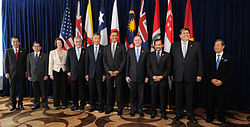On Wednesday, a leak of the draft chapter on Intellectual Property Rights released by Wikileaks appeared to confirm many of these fears. The Centre for Law and Democracy (CLD) intends to prepare a full Analysis of the leaked text shortly, but our preliminary examination finds several glaring problems. One provision commits States Parties to extend copyright protection terms for works authored by natural persons to either 70 or 100 years after the death of the author. 70 years would be a significant extension in New Zealand, Canada, Malaysia, Japan, Vietnam and Brunei, while 100 years would mean extensions in every State except Mexico. CLD believes that it is completely inappropriate to extend the term of protection and, indeed, that existing terms are already far too long given the changes that have taken place in the information space since the Berne Convention was originally agreed (see Reconceptualising Copyright: Adapting the Rules to Respect Freedom of Expression in the Digital Age).
Click here to read the leaked TPP Chapter
Another provision would undermine the immunity from liability that Internet Service Providers (ISPs) enjoy in better practice States when their customers are found to be violating copyright online. This principle of safe harbour is a cornerstone of the Internet, without which many companies would be unable to operate. However, a majority of the States negotiating the TPP favour making this immunity dependent on ISPs’ participation in a programme to terminate Internet service provision to repeat copyright violators. CLD believes that termination schemes represent a breach of the right to freedom of expression (see Analysis of the Korean Copyright Act). They are certainly extremely controversial and vastly unpopular in the States that have attempted to introduce them.
The draft treaty also imposes significant legal restrictions on the ability of users to circumvent digital locks placed by copyright holders – specifically by criminalising the development and distribution of devices that are capable of circumventing the locks – ostensibly to prevent copyright infringement. Anti-circumvention laws are controversial, largely because digital locks often fail to distinguish between illegitimate and legitimate uses, such as the creation of transformative derivative works. While the text contemplates certain exceptions to the restrictions on circumventing digital locks, it is likely that these measures would limit the ability of individuals to engage in legitimate uses of copyrighted works.
Although appropriate protection for intellectual property rights is important, among other things to foster a rich expressive landscape, the overzealous anti-piracy measures that many States have sought to put in place in recent years represent one of the greatest threats to freedom of expression. If accurate, the leaked document reveals that the TPP negotiations are the latest such attempt. It is, at the same time, notable that the draft TPP also reveals that there are many substantial points of disagreement among the participating States, and that most of the problematic provisions face resistance from certain quarters.
The Centre for Law and Democracy believes that it is inappropriate for an important document like the TPP, which will have a significant impact on the Internet and creative content production, to be negotiated behind closed doors. While we recognise that officials need some space to discuss and negotiate, we call on participating States to make drafts public on a regular basis, to be open about their core positions on critical issues and to create forums which allow for the views of other stakeholders to be heard. It is vitally important that the final document strike an appropriate balance between the freedom of expression interests of authors and those of the wider public.
For further information, please contact:
Michael Karanicolas
Legal Officer
Centre for Law and Democracy
email: michael@law-democracy.org
tel: +1 902 448-5290
www.law-democracy.org
twitter: @law_democracy




